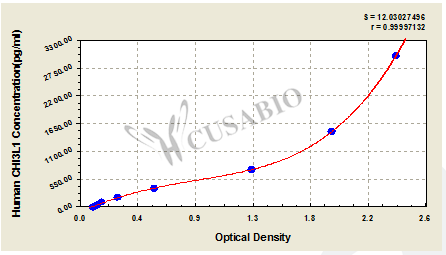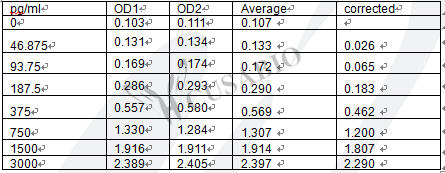CUSABIO’s Human YKL-40/CHI3L1 ELISA Kit is an in vitro enzyme-linked immunosorbent assay for the quantitative measurement of human CHI3L1 in serum, plasma, and tissue homogenates. This assay employs the quantitative sandwich enzyme immunoassay technique, in which CHI3L1 in the samples or standards are sandwiched between pre-coated CHI3L1 antibody and HRP-conjugated antibody specific for CHI3L1. Following a wash to remove any unbound reagent, the TMB substrate solution is added to the wells and color develops in proportion to the amount of CHI3L1 bound in the initial step. The color development is stopped and the intensity of the color is measured at 450 nm via a microplate reader. This kit displays many advantages, including sensitivity, specificity, precision, linearity, and recovery. The product instructions are access to more information.
CHI3L1 is a secreted glycoprotein and prototypic mammalian chitinase-like protein belonging to the glycoside hydrolase family 18. It is synthesized and secreted by numerous cells such as macrophages, neutrophils, and fibroblast-like cells. It is mainly involved in tissue damage, tissue repair, inflammation, and remodeling responses. CHI3L1 has been closely related to diseases including asthma, arthritis, sepsis, diabetes, liver fibrosis, and coronary artery disease. Several solid tumors including breast, colon, kidney, ovarian, prostate, and glioblastoma, have detected the presence of CHI3L1. CHI3L1 signaling plays a critical role in cancer cell growth, proliferation, invasion, metastasis, angiogenesis, activation of tumor-associated macrophages, and Th2 polarization of CD4+ T cells. Elevated CHI3L1 levels are correlated with poor prognosis and decreased survival rates of cancer patients.







